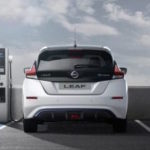 National Grid has said the power system could cope with an overnight boom in electric vehicles (EVs) and that the extra generation capacity required to handle millions of vehicles is no big deal.
National Grid has said the power system could cope with an overnight boom in electric vehicles (EVs) and that the extra generation capacity required to handle millions of vehicles is no big deal.
Nine million electric vehicles on UK roads might require 8GW of extra power generation capacity if people charge them when they like. But smart charging could cut that to 4GW, potentially less, according to National Grid’s EV lead, Graeme Cooper.
Cooper was questioned alongside Ofgem and the Energy Networks Association (ENA) this morning by the Business, Energy and Industrial Strategy Committee.
Cooper said the firm’s modelling suggested “not a tremendous amount of new generation is needed” if energy companies can “marry up the challenge of the generation and the wires to get the generation in the right place”.
Even if uptake of electric vehicles is more aggressive than National Grid’s modelling suggests, Cooper said the system would be able to cope.
“People who lease a car tend to be on a three to four year cycle; people who buy private vehicles tend to be on an eight to nine year cycle. So while a change overnight could be more dramatic [it is unlikely to be] a cliff edge,” he said.
While the UK’s generation mix is changing relatively quickly, the system is “very robust” and is responding to that change, said Cooper. “So I think there is enough time even if we see sharper uptake, to respond in the right way.”
Stewart Reid, who chairs the ENA’s low carbon technologies working group, told the Committee that EVs, if charged flexibly, would also help the system cope in the other extreme, when there is too much inflexible generation on the system.
“Flexible charging brings an opportunity to de-constrain wind. So flexibility is the key,” he said. “It provides additional capacity and also enables us to get the maximum out of existing network assets.”
Asked whether the UK government’s target to phase out new petrol and diesel cars by 2040 should be brought forward to 2030, Cooper said he believed National Grid “would support a more ambitious target” and could “absolutely” cope in that scenario.
The ENA’s Reid said network companies worked on the premise that there could be a “bow wave” before that, based not on government policy, but customer choice.
Cooper agreed. “[Regardless of government mandates] the list of consumers buying combustion cars post 2030 will be a very short list.”
He said even if ramp up of electric vehicles met its most aggressive scenarios, the transmission system would not require a “wholesale upgrade”.
Watch the session here.
Related stories:
Electric vehicles ‘won’t require new power stations’, say analysts
Northern Powergrid: EVs a resource not a problem
Carmakers become aggregators as DNOs fear overnight EVs boom
EVs ‘could provide 11GW of flex’
Lord Redesdale: Idea of EVs as energy storage is “complete crap”
Nissan: Carmaker signals roadmap to energy services company
Flexitricity chief: UK has enough spare power electrify every car on the road
Government finds £20m for vehicle to grid development
Greg Clark calls for automakers and energy industry to collaborate on battery storage
As solar generation makes history, National Grid starts to feel the burn
Tesla: People don’t engage with energy bills, but they will have to
Follow us at @EnergystMedia. For regular bulletins, sign up for the free newsletter.




Sadly so many of the so called smart meters being installed under the present government programme actually eliminate the possibility of diffential tariffs at quieter times of day( or night). So how can the Grid ensure that EV charging takes place at non peak times?
Meters by themselves can’t really control charge times, without restricting power to the whole dwelling and causing brownouts. The real answer is in smart chargers, I have personally seen an example of this with a local trial I joined where the power company replaced my dumb charger with a smart one where they can set charge times as off peak, I can opt out or set days where I need charge by a specific time to avoid having any issues. This program is done through the Flo charger and its backend software. Unless you individually meter each vehicle charger, which is impractical, I believe you would need to do it at the charger level.
It’ll probably be the distribution networks make that happen, potentially in collaboration with vehicle manufacturers. Some of them talk about setting out rules here: https://energystst.wpengine.com/carmakers-become-power-aggregators-as-dnos-fear-overnight-evs-boom/
Proper smart metering, or at least a smart charge point, may ultimately become mandatory for EV owners.
But it’s clear that some of the DNOs are less confident about a boom than Grid.
Equally, bringing forward the EV target might give them scope to push for more generous price controls.
Agreed, needs to be mandatory. 30million vehicles charging at 3kW is 90GW peak demand. That’s far too big to be left to the market to decide charging times. There will need to be mandatory control, probably of smart charging. National Grid’s FESs have much less than 30m cars. NG really has little risk if their assumptions/ calcs are wrong. It is politically better if NG can point to someone else (the DNOs) as the obstacle for this purportedly green policy.
“No problem” says NG at the grid level. As has already been pointed out, the potential for demand problems is a greater risk at the distribution level
A couple of points I would like to make on energy sources, whatever the end usage maybe. Gas fired power generation is going to be the main provider at the grid level, that is available whatever the weather or time of year. I wonder if NG gas is in the same positive world as the power side?
Localised energy storage has to be encouraged by more than just EFR and capacity market. Should the DNO [ DSO] be allowed to attract investment in storage to deal with demand at the neighbour-hood level and the use of EV batteries for the even smaller local level I.E. a small housing estate.
And then we have Ofgem. With remarkable astute time they have published the intent to reduce DUOS charges, just as we need to get more investment into distribution networks
There is no point in providing electricity from fossil fuels to charge electric vehicles. So it’s a good thing that nuclear powered electricity will be too cheap to meter. Thank goodness we have experts in the industry who can guide us through the years to 2050.
you can now buy a charger from Ohme which monitors live grid prices and chooses the charging times to save money. there are even times it is possible to get paid to charge your car.
Actually @Brian Donnelly , sadly the new Hinkley power station will produce some of the most epensive electricity on the market, the UK gov’t has committed us to pay a premium price for power produced by it.